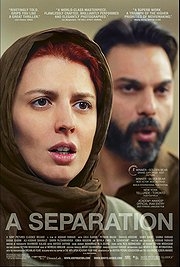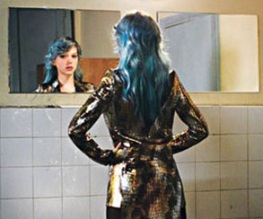A Separation

From the very opening scene you get the feeling that A Separation is going to be a tough, emotional watch. The film begins with Nader (Moaadi) and Simin (Hatami) in a judge’s chamber trying to get divorced. Simin wants to emigrate out of Iran as she feels this will lead to a better life for their 11 year old daughter, Termeh (Farhadi). However, Nader’s father is suffering from Alzheimer’s, and so he is reluctant to leave home and even more reluctant to let his daughter move abroad.
[FLOWPLAYER=http://uk.image-1.filmtrailer.com/73541.jpg|http://uk.clip-1.filmtrailer.com/7372_22881_a_4.flv,275,180]
This opening expertly sets up the film’s two main themes: conflict and responsibility. Each partner feels duty-bound to someone, and this is a consistent thread running through all the adults in the film. However, whether it be family or faith, Farhadi shows us how adhering to this sense of responsibility too much can blind you to what’s really important, and as is often the case in situations of this nature, it is the children who suffer, caught in the crossfire of a world they are not nearly ready for. Farhadi seems to be channelling Philip Larkin’s famous verse: “They fuck you up, your mum and dad / They may not mean to, but they do / They fill you with the faults they had / And add some extra, just for you”.
The conflict that plays throughout the film stems from an altercation between Nader and the pregnant housekeeper he hires to help look after his father, Razieh (Bayat). When Nader comes home to find the house empty and his father near death on the floor, he challenges Razieh upon her return and ends up physically throwing her from his flat, causing her to tragically miscarry, and implicating Nader in a murder charge. The court case that pervades the film is a brilliant indictment not only of the legal system, but also of humanity itself, as Farhadi shows each character to lying, abusing and threatening each other in their attempt to win, all in full view of the two young children, and often directly implicating them in the arguments.
Truly the children in this film steal the show. Termeh imbues her character with an emotional fragility and dignity that belies her years, and indeed it is her who we sympathise with the most. Equally wonderful in her role is Kimia Hosseini as Somayeh, the 8 year old daughter of Razieh and her emotionally unstable husband Hodjat (Shahab Hosseini). She approaches every scene with a natural curiosity that is endearing, charming and at times very funny. Some of the most poignant moments in the film come from watching this brilliant, innocent girl wander amongst criminals in the halls of a courthouse, without any frame of reference to decipher what’s going on, nor knowing why she is no longer going to have a baby brother or sister. As I write this, I’m choking up again.
As is the case with many foreign films, prior knowledge of the culture being portrayed does impact on the understanding of the issues being dealt with, with Farhadi himself admitting that it’s probably easier for an Iranian audience to establish a complete relationship with the film. However, at the film’s core is a family struggle, something with which most everyone can identify. The film’s climax, one of the most powerful, heartbreaking pieces of cinema I’ve ever seen, summarises this struggle that has persisted throughout the film, firmly focussing our attention on Termeh and allowing us to reflect on her role within the drama, and to ponder on how Somayeh may cope in the coming months. Simply a stunning, thought-provoking, expertly crafted, must-see piece of cinema.





Recent Comments